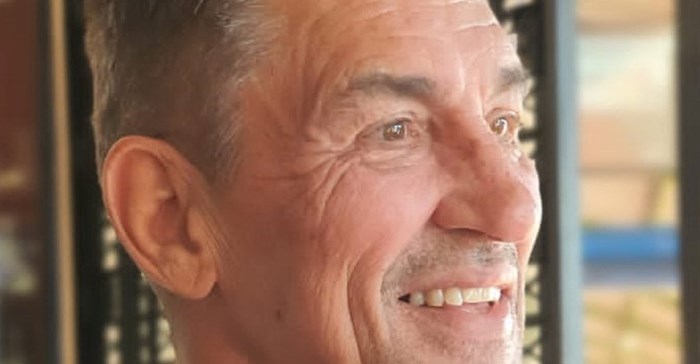Following the entry of stroke-care data into the Res-Q registry, Netcare Milpark and Netcare Unitas hospitals now meet the criteria for stroke ready centres.

Source: Supplied. Carl De Villiers suffered a stroke in March last year. He is alive thanks to a mechanical thrombectomy and intense rehabilitation therapy.
The current units have therefore validated that they are equipped to provide the full spectrum of diagnostic and interventional services for identification and treatment of stroke 24 hours a day, in line with global best practice.
“Improving outcomes for stroke patients requires global collaboration and information sharing to support healthcare providers all over the world to continuously improve local standards of care,” says Mande Toubkin, general manager emergency, trauma, transplant and CSI at Netcare.
“It is for this reason that Netcare’s emergency and trauma programme has been contributing towards the Res-Q quality of stroke-care registry, an initiative of the European Stroke Organisation's enhancing and accelerating stroke-treatment project, which aims to assist healthcare systems across the world to improve stroke outcomes for their patients.
“In addition to Netcare Milpark and Netcare Unitas hospitals fulfilling the requirements of stroke-ready units, Netcare uMhlanga Hospital is also making excellent progress towards meeting the international set of measures confirming the facility has necessary systems, expertise and technology in place to assist stroke patients,” adds Leanne van Rooy, Netcare emergency and trauma programme manager.
“Stroke-ready units are equipped to provide advanced stroke interventions that can, in many cases, help to reduce the severity of a stroke and save lives if initiated as soon as possible after the onset of a stroke.”
Recently Netcare’s emergency and trauma division hosted a webinar for doctors, emergency medical services practitioners and nurses to share the learnings and experiences of these stroke-ready units.
Van Rooy notes that a multidisciplinary approach to stroke care was reflected in the stroke webinar. Presentations included perspectives of paramedics, nurses, emergency-medicine professor Feroza Motara; neurologist Dr Ismail Moola; a dietician, speech and occupational therapists, a physiotherapist and unit managers of the stroke-ready facilities.
“Not all emergency and trauma departments are able to offer the full range of highly specialised stroke interventions that are available at the Netcare Milpark and Netcare Unitas hospitals.
Improving outcomes for stroke patients requires global collaboration and information sharing to support healthcare providers all over the world to continuously improve local standards of care
"However, healthcare workers at other facilities should be empowered to identify stroke promptly and whether a stroke patient could potentially benefit from advanced treatments offered at stroke-ready units, so that rapid inter-hospital transfers can be arranged for more patients to reach these units in time,” Van Rooy says. Zasskia Weiss, unit manager of the emergency and trauma department at Netcare Milpark Hospital, has been leading the stroke-care programme at this world-renowned Level 1 trauma centre, which is accredited by the Trauma Society of South Africa.
“Our unit takes a multidisciplinary approach to stroke care, with the team including a co-ordinator, two neurologists, three neurosurgeons, an interventional radiologist, as well as speech therapists, occupational therapists, physiotherapists, psychologists and social workers,” she says.
“The pre-hospital care a patient receives and their physical rehabilitation after being discharged are also crucial to the outcome and extent of a patient’s recovery from a stroke. We therefore work closely with emergency medical services including Netcare 911, and Netcare Rehabilitation Hospital, as part of our stroke programme.”
Weiss explains that the stroke programme in place at Netcare Milpark Hospital ensures seamless care of patients. “This begins with pre-notification from emergency medical services to alert us of an incoming stroke emergency, and on the patient’s arrival the doctor in the emergency department performs a quick stroke scale assessment, followed by a CT or MRI scan where needed,” she says.
The multidisciplinary team confers to decide which treatment or combination of treatments are required, which may include medication to dissolve clots, a mechanical thrombectomy to remove a blood clot and restore crucial blood flow to the brain, or conservative treatments.
“Following the assessment of the stroke victim and their condition, the patient is either cared for in the specialised stroke ward or the intensive care unit. Therapy begins in the ward and thereafter, following discharge from an acute care hospital, people who have had a stroke often require intensive physical rehabilitation to regain optimal functional ability and quality of life,” Weiss explains.
The webinar programme concluded with a case study of a patient who has made remarkable progress since suffering a life-threatening stroke.
“Seamless, rapid and appropriate evidence-based stroke management such as this patient received, demonstrate what can be achieved with world-class systems in place that promote the best and safest care,” Toubkin concludes.







































